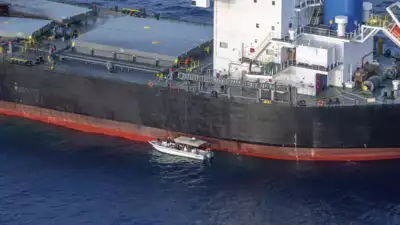Two commercial vessels were damaged in missile attacks by Yemen’s Houthi militia group in the Gulf of Aden within the past 24 hours, according to a statement released by the US Central Command (CENTCOM) on Sunday.
This marks a significant escalation in the Houthis’ ongoing campaign against international maritime shipping.
The first attack targeted the Tavvishi, a Liberian-flagged and Swiss-owned container ship, which was struck by an anti-ship ballistic missile. CENTCOM reported that the vessel sustained damage, but no crew members were injured.
The Tavvishi is managed by MSC Ship Management, although the firm has not yet provided any comments on the incident.
In the second attack, two missiles hit the Norderney, a German-owned cargo ship flying the flags of Antigua and Barbuda.
Despite the damage inflicted, the ship continued its voyage with no injuries reported among its crew. The Norderney is managed by Sunship Schiffahrtskontor, which has also not issued a statement.
The Houthi militia, backed by Iran, claimed responsibility for both attacks, asserting that they had set the Norderney ablaze. However, CENTCOM’s account contradicts this claim, stating that the vessel, although damaged, remained operational.
The attacks are part of a broader Houthi campaign aimed at disrupting global shipping lanes. Since November, the group has intensified its efforts, citing solidarity with Palestinians in Gaza as their motivation.
Their actions have included the sinking of one ship, the seizure of another, and an attack that resulted in the deaths of three crew members. These assaults have had a significant impact on global maritime routes, forcing vessels to avoid the Suez Canal and take longer, more perilous journeys around Africa.
The ongoing Houthi campaign has heightened concerns about the potential for the Israel-Hamas conflict to spread, thereby destabilizing the wider Middle East region.
In response to these threats, both the United States and Britain have launched strikes against Houthi targets. CENTCOM confirmed that its forces had destroyed an uncrewed aerial system over the Gulf of Aden, as well as two land attack cruise missiles and a missile launcher located in Houthi-controlled areas of Yemen.
The increased frequency and severity of these attacks underscore the strategic significance of the Gulf of Aden, a critical chokepoint for global trade. The disruption of shipping lanes in this region not only affects commercial interests but also poses a broader threat to international security and economic stability.
As the situation develops, maritime operators are likely to enhance their security measures and reroute their vessels to mitigate risks.
The international community continues to monitor the situation closely, with ongoing military operations aimed at curbing the Houthi threat and ensuring the safety of maritime navigation.
With the escalation of hostilities in the Gulf of Aden, the importance of diplomatic and military efforts to stabilize the region and protect international shipping routes becomes ever more critical.
The Houthi attacks have brought into sharp focus the vulnerabilities of global maritime logistics and the far-reaching implications of regional conflicts on worldwide trade.

